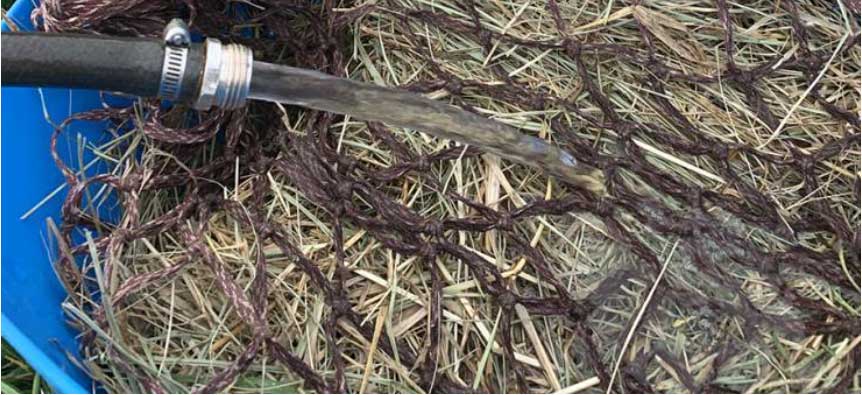
By Kentucky Equine Research Staff
Hay produces dust particles that contain mold, endotoxins, mites, and other microscopic antigens. Inhaling those respirable dust particles is the most significant exacerbator of severe equine asthma (SEA). While studies show that hay soaking decreases the production of dust particles, only one study performed to date demonstrates that hay soaking improves lung function.*
In that study, 10 horses with SEA belonging to the Equine Asthma Research Laboratory at the University of Montreal, Canada, were recruited. All horses were in exacerbation at the start of the six-week study. Horses were split into two groups and fed either soaked alfalfa pellets in a feeder or hay that had been soaked in cold water for 45 minutes before feeding at ground level. At baseline and again at the end of the study, airway inflammation was measured via bronchoalveolar lavage (BAL, a “lung wash”), and tracheal mucous scoring was performed. On weeks 0, 2, 4, and 6, researchers assigned respiratory clinical scores based on nasal flare and abdominal effort while breathing. They also measured lung function, as determined by lung resistance/obstruction, during those weeks.
“Clinical respiratory scores and pulmonary function improved significantly during the study in both groups of horses,” explained Ashley Fowler, Ph.D., a Kentucky Equine Research nutritionist.
No significant improvement, however, was noted in airway inflammation in the soaked hay group based on BAL findings of “pulmonary neutrophilia.” This means that a specific type of white blood cell, called neutrophils, persisted in the BAL fluid throughout the treatment period.
“Pulmonary neutrophilia is known to occur when respirable dust exists in the horse’s breathing zone—the two-foot sphere around the nose,” Fowler said.
Despite effectively reducing respirable particles, hay soaking is perceived as cumbersome by many owners, resulting in poor compliance. Further, alternatives to hay soaking such as expensive pellets, oil-mixed hay, and haylage/silage also have limitations. Nonetheless, methods that decrease respirable particles are essential for decreasing the clinical signs of SEA, including labored breathing, coughing, and increased mucus production.
“Because SEA is characterized by inflammation, current recommendations include adding marine-derived anti-inflammatory omega-3 fatty acids to the diet.** Kentucky Equine Research offers EO-3 and ReSolvin EQ, both of which contain EPA and DHA in a palatable formula,” Fowler said.
Owners are also encouraged to decrease dust in the horse’s environment through ventilation and other management practices like turnout and low-dust bedding.
Reprinted courtesy of Kentucky Equine Research. Kentucky Equine Research is an international equine nutrition, research, and consultation company serving horse owners and the feed industry. Our goals are to advance the industry's knowledge of equine nutrition and exercise physiology, apply that knowledge to produce healthier, more athletic horses, and support the nutritional care of all horses throughout their lives. Learn more at KER.com.
There a more informative articles in our section on Health & Education.
*Westerfeld, R., F. Payette, V. Dubuc, E. Manguin, K. Picotte, G. Beauchamp, C. Bedard, and M. Leclere. 2023. Effects of soaked hay on lung function and airway inflammation in horses with severe asthma. Journal of Veterinary Internal Medicine. doi:10.1111/jvim.16919.
*Couëtil, L.L., J.M. Cardwell, V. Gerber, et al. 2016. Inflammatory airway disease of horses—Revised consensus statement. Journal of Veterinary Internal Medicine 30(2):503-515.

































